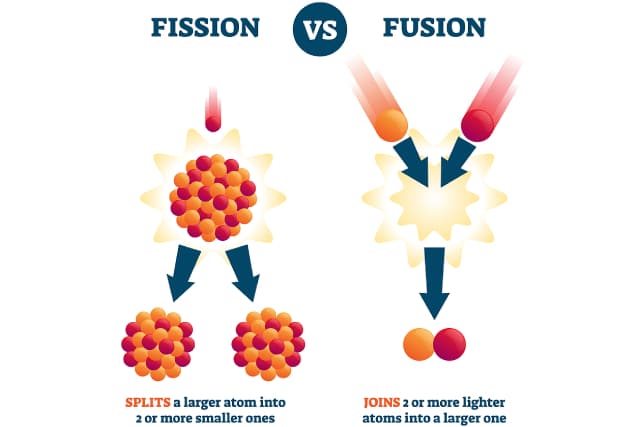
If you always watch the news or are just an avid fan of science, you would likely be familiar with nuclear reactions. In nuclear physics, a nuclear reaction is defined as the process of collision between two nuclei or nuclear particles to produce a different product. Generally, what is made from this collision is a nuclide, a kind of atom that has a specific number of protons and neutrons in the nucleus.
In a physics tuition class, you will learn that there are different nuclear reactions, the most notable of which are nuclear fission and nuclear fusion. These nuclear reactions are both natural atomic processes releasing enormous amounts of energy. However, they are considered opposites in many ways. This article will give you some ideas on what nuclear fission and nuclear fusion are and learn how to set them apart.
What is nuclear fission?
A nuclear fission reaction happens when a neutron crashes into a larger atom, exciting it upon impact to split into two smaller atoms called fission products. With the split of each atom occurs the release of an enormous amount of energy. Here, additional neutrons may also be released to initiate a chain reaction, which has the potential to create dangerous meltdowns.
Nuclear power plants – power plants that apply nuclear physics principles to generate electricity – use nuclear fission in their operations. The most used atoms for fission reactions in nuclear power reactors are uranium and plutonium because they are relatively easy to initiate and control.
What is nuclear fusion?
In contrast to nuclear fission, atoms do not split. Instead, two atoms combine to generate a different and heavier atom, consisting of subatomic particles. For example, two hydrogen atoms may fuse to form one helium atom. Fusion, in other words, requires the combination of two or more light atoms.
Nuclear fusion creates a tremendous amount of energy that is multiple times greater than that of fission. A physics fun fact is that this very same process powers the sun. Physicists and fellow scientists constantly study fusion reactions; however, it is almost always difficult to sustain them for an extended period due to the vast amount of pressure and temperature needed to join the nuclei together.
What are the major differences between the two?
As mentioned, fission and fusion are both nuclear processes that alter atoms to produce energy. Though they are similar, they have significant differences making them opposites.
For one, nuclear fission involves breaking a heavy atom into two smaller ones, while nuclear fusion is the combination of two lighter atoms to form a heavier atom. The latter also does not occur naturally; its nuclear reaction is deliberately created. On the other hand, nuclear fusion reactions are naturally found in many places or instances in the universe. Every star, for example, uses a nuclear reaction to generate energy. The first naturally occurring fusion reactions are said to have happened soon after the supposed “Big Bang Nucleosynthesis.”
Moreover, in nuclear fission, the process of splitting a heavy atom into two smaller ones generally do not use plenty of energy. Contrary to this, nuclear fusion requires extensive amounts of heat and pressure to initiate the reaction, which is also why it can produce more significant amounts of energy compared to fission reactions.
Conclusion
Nuclear fission and nuclear fusion are two processes in physics that you need to learn and understand more profoundly, as they are relevant in our daily lives. Especially in the advent of nuclear energy and its various military uses today, having a good idea of these unusual nuclear reactions is more necessary than ever.
If you want to understand nuclear physics better and learn more interesting facts and topics, consider signing up for a physics tuition class. Here at Best Physics TuitionTM Centre, you can choose from various extensive and engaging courses such as our H2 Physics Tuition class and O Level Physics Tuition class to help you master physics, its principles, and processes. Our physics tutors comprehensively teach all of our lessons to ensure a practical yet fun time learning physics inside and out!
